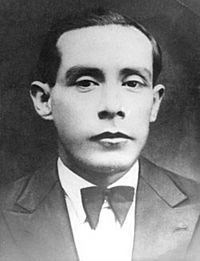Felipe Pinglo Alva facts for kids
Quick facts for kids
Felipe Pinglo Alva
|
|
|---|---|

Felipe Pinglo Alva
|
|
| Background information | |
| Birth name | Felipe Pinglo Alva |
| Born | July 18, 1899 |
| Origin | Lima, (now Peru) |
| Died | May 13, 1936 (aged 36) Lima, Peru |
| Genres | Música criolla |
| Occupation(s) | Composer pianist |
Felipe Pinglo Alva (born July 18, 1899 – died May 13, 1936) was a very important Peruvian musician. He is often called the "father of Peruvian Música criolla" music. People also knew him as the "Immortal Bard." Pinglo was a talented poet and songwriter. His most famous song is "El Plebeyo," which means "The Commoner."
In Peru and across Latin America, Pinglo's name is linked to the Peruvian vals criollo. This is a special type of Peruvian music. It has a 3/4 rhythm, fancy guitar playing, and lyrics. These songs often tell stories about lost love or old Lima.
Contents
Life Story of Felipe Pinglo Alva
Felipe Pinglo Alva was born on July 18, 1899. He grew up in Barrios Altos, an old part of Lima, Peru. This area was known for its working-class families. His father was a schoolteacher. Sadly, Felipe's mother died when he was a young child.
Felipe grew up in a poor family. But his father and aunts taught him many things. This made him smart and aware of social issues. Pinglo was known for being a bit of a Bohemian. This means he lived an artistic and unconventional life. He was also often sick and walked with a slight limp.
Early Musical Talents
Felipe was a natural musician. As a young boy, he earned money by playing songs he heard. He would listen to local military bands in the town square. Then, he would play the songs by ear. He also read works by famous writers like Rubén Darío.
In 1917, when he was 18, he wrote his first vals. It was called "Amelia." This song quickly became very popular. For the next 19 years, until he died in 1936, he wrote about 300 songs. Many of these songs are now lost.
Impact of Criolla Music
The Música criolla movement was very important. It influenced music all over Latin America during the 20th century. This movement created many romantic songs. Artists from different generations and countries still sing Pinglo's songs today.
Some famous artists who have sung his songs include:
- Los Panchos
- Los Embajadores Criollos
- Los Chalanes del Perú
- Julio Jaramillo
- Vicente Fernández
- Soledad Bravo
- Mercedes Sosa
- Los Morochucos
- Los Troveros Criollos
- Pedro Infante
- Caetano Veloso
- Plácido Domingo
- Eva Ayllon
- Olimpo Cárdenas
- Julio Iglesias
Famous Songs by Pinglo
Felipe Pinglo Alva wrote many well-known songs. Here are some of them:
- El Plebeyo - The Commoner
- El huerto de mi amada - The orchard of my beloved
- El espejo de mi vida - The mirror of my life
- Jacobo el Leñador - Jacob the Lumberjack
- Oracion del Labriego - Worker's Prayer
- Pasion y Odio - Passion and Hate
Pinglo's Social Ideas
Pinglo cared deeply about people who were poor. This led to many rumors about his political views. Sometimes, his songs were even banned. For example, during the time of Óscar R. Benavides, who was a ruler of Peru, "El Plebeyo" was not allowed on the radio.
People often thought Pinglo supported certain political groups. Some believed he was an Aprista. Others thought he was allied with José Carlos Mariátegui. However, because he was a Bohemian, he might have also believed in Anarcho-syndicalism. This is a political idea about workers controlling society.
Writings from his time show that Pinglo took part in cultural events. These events were often organized by worker groups. For example, he attended a tribute to a sculptor named Delfín Lévano. This event took place in a theater in the La Victoria neighborhood of Lima.
See also
 In Spanish: Felipe Pinglo Alva para niños
In Spanish: Felipe Pinglo Alva para niños

